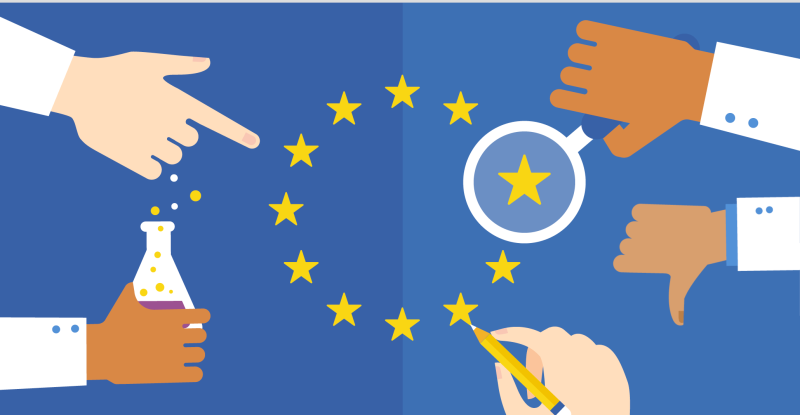‘Current GMO legislation not fit for innovative technologies’: European Commission calls for revamp of agricultural biotechnology rules to allow gene editing, promote sustainable farming
‘Current GMO legislation not fit for innovative technologies’: European Commission calls for revamp of agricultural biotechnology rules to allow gene editing, promote sustainable farming


The European Commission published, at the request of the Council, a study on New Genomic Techniques (NGTs). The study shows that NGTs, which are techniques to alter the genome of an organism, have the potential to contribute to a more sustainable food system as part of the objectives of the European Green Deal and the Farm to Fork Strategy.
At the same time, the study finds that the current GMO legislation, adopted in 2001, is not fit for purpose for these innovative technologies. The Commission will now start a wide and open consultation process to discuss the design of a new legal framework for these biotechnologies.
Commissioner for Health and Food Safety, Stella Kyriakides, said:
The study we publish today concludes that New Genomic Techniques can promote the sustainability of agricultural production, in line with the objectives of our Farm to Fork Strategy. With the safety of consumers and the environment as the guiding principle, now is the moment to have an open dialogue with citizens, Member States and the European Parliament to jointly decide the way forward for the use of these biotechnologies in the EU.
NGTs developing rapidly in many parts of the world
NGTs, which can be defined as all techniques to alter the genome of an organism developed after 2001 (when the EU’s legislation on GMOs was adopted), have rapidly developed over the last two decades in many parts of the world, with some applications already on the market of some EU trade partners.
The main findings of the study are:
- NGT products have the potential to contribute to sustainable food systems with plants more resistant to diseases, environmental conditions and climate change effects. Moreover, the products can benefit from higher nutritional qualities such as healthier fatty acid content, and reduced need of agricultural inputs such as pesticides;
- By contributing to the EU’s objectives of innovation and sustainability of food systems, as well as a more competitive economy, NGTs can have benefits for many sectors of our societies;
- At the same time, the study also analysed concerns associated with NGT products and their current and future applications. Concerns included the possible safety and environmental impact, for example, on biodiversity, the coexistence with organic and GM-free agriculture, as well as labelling;
- NGTs are a very diverse set of techniques and can achieve different results, with some plant products produced by NGTs being as safe as conventionally bred plants for human and animal health and for the environment;
- The study finds that there are strong indications that the current 2001 GMO legislation is not fit for purpose for some NGTs and their products, and that it needs adaptation to scientific and technological progress.
Next steps
The study will be discussed with EU ministers at the Agriculture and Fisheries Council in May. The Commission will also discuss its findings with the European Parliament and all interested stakeholders.
In the coming months, an impact assessment, including a public consultation, will be carried out to explore policy options concerning the regulation of plants derived from certain NGTs.
Read the original post

 | Videos | More... |

Video: Nuclear energy will destroy us? Global warming is an existential threat? Chemicals are massacring bees? Donate to the Green Industrial Complex!
 | Bees & Pollinators | More... |

GLP podcast: Science journalism is a mess. Here’s how to fix it

Mosquito massacre: Can we safely tackle malaria with a CRISPR gene drive?

Are we facing an ‘Insect Apocalypse’ caused by ‘intensive, industrial’ farming and agricultural chemicals? The media say yes; Science says ‘no’
 | Infographics | More... |

Infographic: Global regulatory and health research agencies on whether glyphosate causes cancer
 | GMO FAQs | More... |

Why is there controversy over GMO foods but not GMO drugs?

How are GMOs labeled around the world?

How does genetic engineering differ from conventional breeding?
 | GLP Profiles | More... |

Alex Jones: Right-wing conspiracy theorist stokes fear of GMOs, pesticides to sell ‘health supplements’




 Trust issues: What happens when therapists use ChatGPT?
Trust issues: What happens when therapists use ChatGPT? Fighting deforestation with CO2: Biotechnology breakthrough creates sustainable palm oil alternative for cosmetics
Fighting deforestation with CO2: Biotechnology breakthrough creates sustainable palm oil alternative for cosmetics Viewpoint: Video — Big Solar is gobbling up productive agricultural land and hurting farmers yet providing little energy or sustainabilty gains
Viewpoint: Video — Big Solar is gobbling up productive agricultural land and hurting farmers yet providing little energy or sustainabilty gains California, Washington, Oregon forge immunization alliance to safeguard vaccine access against federal undermining
California, Washington, Oregon forge immunization alliance to safeguard vaccine access against federal undermining Viewpoint — Fact checking MAHA mythmakers: How wellness influencers and RFK, Jr. undermine American science and health
Viewpoint — Fact checking MAHA mythmakers: How wellness influencers and RFK, Jr. undermine American science and health 30-year-old tomato line shows genetic resistance to devastating virus
30-year-old tomato line shows genetic resistance to devastating virus The free-range chicken dilemma: Better for birds, but with substantial costs
The free-range chicken dilemma: Better for birds, but with substantial costs ‘You have to treat the brain first’: Rethinking chronic pain with Sanjay Gupta
‘You have to treat the brain first’: Rethinking chronic pain with Sanjay Gupta
